Olympus Zuiko Digital ED 70-300mm f/4.0-5.6
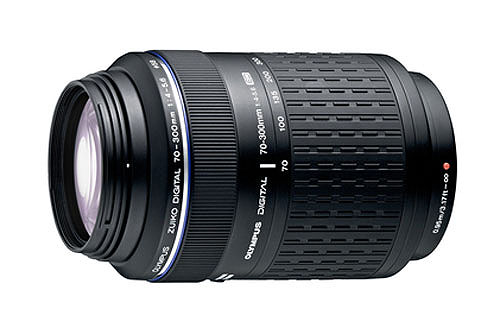 The Olympus Zuiko Digital ED 70-300mm f/4-5.6 is ideal for nature photography due to the 2x crop factor doubling the focal length equivalent. |
Due to the Four Thirds system's small sensor, this popular focal range is given a telephoto boost, making it an ideal range for sports and wildlife, where you can't get close to the action. Olympus' 70-300mm costs around £350 and has three ED glass elements in its design.
At present, there are no third party manufacturers currently offering such a lens for Four Thirds cameras, so Olympus have a kind of monopoly here.
Olympus Zuiko Digital ED 70-300mm f/4.0-5.6: Handling and features
Being 127mm long with a diameter of 80mm, this 70-300mm around the same dimensions as most other lenses covering this focal range. Much of the barrel is constructed from high-quality injection moulded plastics, which help keep the overall weight down to only 620g. The fit and finish of the lens is good for a lens of this level.
It has a close focusing distance of 1.2metres when using auto focus, and only 96cm when focusing manually which gives a maximum magnification of 1:2. this will also make the lens suitable for photographing insects and other small subjects where the extended working distance will be an asset.
Autofocus is powered by a motor in the lens, which makes no claims to be silent. The noise generated during focusing isn't overly disturbing and the speed will satisfy all but the most demanding photographers. The lens does tend to hunt a little in lower light conditions though. As no focus limiter switch is provided, the lens will tend to hunt through the entire focus range in low-light and low-contrast situations.
Manual focus is performed indirectly via a fly-by-wire system. Turning the focus ring makes the focus motor move the focus back and forth. Although the system works reasonably well, I found this control method a bit of an acquired taste. For me the manual focus action seems to have a little lag, and I didn't find it as easy to make fine adjustments as with mechanical, direct focusing systems.
Olympus Zuiko Digital ED 70-300mm f/4.0-5.6: Performance
For this review, the lens was tested on a 12Mp Olympus E-30 using Imatest.
At f/4 and 70mm, this lens doesn't perform as well as I expected it would. The resolution recorded by Imatest is of a level that is just acceptable. Whether it is an issue with the sample provided for review or not, I couldn't say without testing another copy. Stopping the lens down to f/5.6 drastically improves matters. Here the lens produces images with very good sharpness in the centre, and approaching good towards the edges. When set to 70mm, the lens performs best when set to f/11, where the resolution across the frame is very good indeed.
Zooming to 150mm actually improves the performance at maximum aperture. Here the resolution is approaching good right across the frame. The best quality across the frame is achieved at f/8, where the sharpness is very good across the frame.
At the long end of the range the performance at maximum aperture drops off a little again, but is still acceptable. f/11 provides the best quality across the frame. Here the resolution is very good from edge to edge.
| Resolution at 70mm |
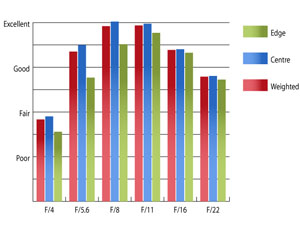 |
| Resolution at 150mm |
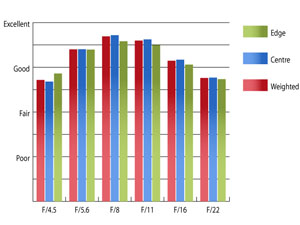 |
| Resolution at 300mm |
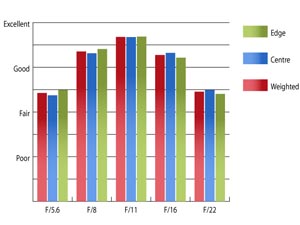 |
Throughout the zoom range colour aberrations are well controlled at maximum aperture, barely exceeding half a pixel-width. Stopping the lens down seems to increase the presence of fringing in images and is at its worst at 300mm and f/22. Here Imatest recorded fringing covering 1.3 pixel-widths, which may pose problems in areas of high contrast.
| Chromatic Aberrations at 70mm |
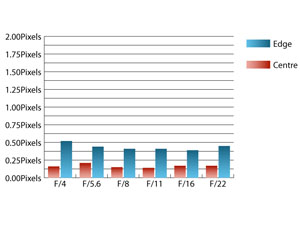 |
| Chromatic Aberrations at 150mm |
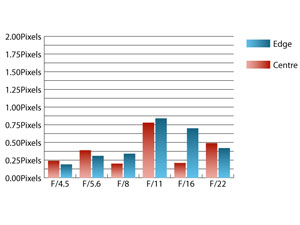 |
| Chromatic Aberrations at 300mm |
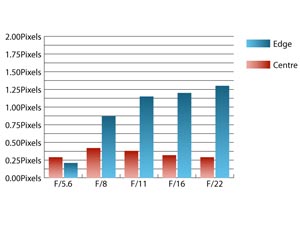 |
Light falloff towards te corners is superbly controlled at 70mm, where the corners are only 0.3stops darker than the image centre. This difference will barely be noticeable in normal image taking scenarios. By 300mm, the level of falloff rises to 0.4stops, but this is still commendable performance.
Distortion is also well controlled. At 70mm Imatest recorded 0.588% barrel distortion, which will only be visible in the most critical of applications. Distortion is just as well controlled at 300mm, with Imatest registering 0.529% pincushion distortion.
| Click the thumbnail to open the larger image. |
 |
| Click the thumbnail to open the larger image. |
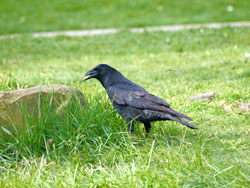 |  |
Strong point sources of light in the frame will cause a noticeable loss of contrast. This may cause problems in contra-light situations. A deep plastic lens hood is provided, which does a sterling job of keeping extraneous light from causing flare and ghosting problems. With the hood attached, light sources just outside the frame pose few problems. Without the hood, quite a bit of flare and a general loss of contrast is apparent.
Olympus Zuiko Digital ED 70-300mm f/4.0-5.6: Verdict
 As no other manufacturers currently produce a lens of this range fr Four Thirds cameras, this may be your only choice for a 600mm equivalent angle of view, without spending a fortune. In that scope, this lens represents good value, despite its flaws.
As no other manufacturers currently produce a lens of this range fr Four Thirds cameras, this may be your only choice for a 600mm equivalent angle of view, without spending a fortune. In that scope, this lens represents good value, despite its flaws. If the resolution at maximum aperture could be improved, even only slightly, Olympus would be onto a winner with this lens.
Olympus Zuiko Digital ED 70-300mm f/4.0-5.6: Pros
 600mm super-telephoto equivalent 600mm super-telephoto equivalent |
 Light weight Light weight |
 Close focus ability Close focus ability |
 Good optical quality when stopped down Good optical quality when stopped down |
 Low distortion Low distortion |
Olympus Zuiko Digital ED 70-300mm f/4.0-5.6: Cons
 Poorer performance than I expected at maximum aperture Poorer performance than I expected at maximum aperture |
 Chromatic Aberrations at 300mm Chromatic Aberrations at 300mm |
| FEATURES |  |
| HANDLING |  |
| PERFORMANCE |  |
| VALUE FOR MONEY |  |
| OVERALL |  |
Olympus Zuiko Digital ED 70-300mm f/4.0-5.6: Lens specification
| Price: | £349 |
| Contact: | http://www.olympus.co.uk |
| Filter size: | 58mm |
| Format: | Four Thirds |
| Construction: | 14 elements in 10 groups |
| Angle-of-view: | 18 - 4.1 degrees |
| 35mm equivalent focal length (on Four Thirds body): | 140-600mm |
| Internal focusing: | No |
| Image stabilisation: | No |
| Minimum focus: | 96cm |
| Maximum aperture: | f/4-5.6 |
| Minimum aperture: | f/22 |
| Weight: | 620g |
| Size (lxw): | 127mm x 80mm |
| In the box: | Lens Hood |
The Olympus Zuiko Digital ED 70-300mm f/4.0-5.6 costs £349 and is available from Warehouse Express here:
Olympus Zuiko Digital ED 70-300mm f/4.0-5.6
Add your message
Login required
Please login here or if you've not registered, you can register here. Registering is safe, quick and free.
Please login here or if you've not registered, you can register here. Registering is safe, quick and free.
photodo Stats
1102 lenses
428 MTF tests
74 in-depth photodo reviews
100+ users join each day
Help the lens community by reviewing or rating a lens today via our lens search
428 MTF tests
74 in-depth photodo reviews
100+ users join each day
Help the lens community by reviewing or rating a lens today via our lens search
Latest Lens Reviews
- Chinon 28mm f/2.8 Vintage Lens Review
- Canon EF 70-200mm f/4L IS II USM Lens Review
- Samyang AF 85mm f/1.4 EF Review
- Sigma 70mm f/2.8 DG Macro Art Review
- Samyang AF 24mm f/2.8 FE Review
- Meike 50mm f/1.7 Review
- Tamron 70-210mm f/4 Di VC USD Review
- Lensbaby Burnside 35mm f/2.8 Review
- Asahi Super Takumar 50mm f/1.4 Review
- Asahi Super-Multi-Coated Takumar 135mm f/3.5 Review
